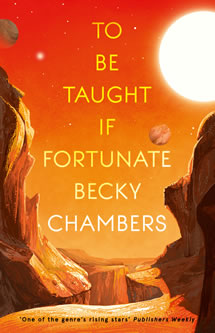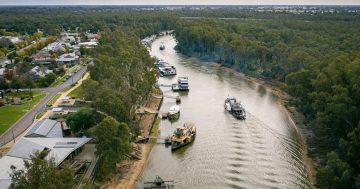Reviewed by Robert Goodman.
By Becky Chambers, Hachette, $27.99.
 Becky Chambers follows up her highly successful Wayfarer series with… more hard but humanist science fiction that is probably, possibly, not set in the same universe (it doesn’t really matter). To Be Taught if Fortunate is the tale of a group of explorers, sent to survey the moons and planets orbiting a distant star. The book starts with a warning which gives the whole narrative an underlying feeling that there is some impending danger, but it takes its sweet time getting there.
Becky Chambers follows up her highly successful Wayfarer series with… more hard but humanist science fiction that is probably, possibly, not set in the same universe (it doesn’t really matter). To Be Taught if Fortunate is the tale of a group of explorers, sent to survey the moons and planets orbiting a distant star. The book starts with a warning which gives the whole narrative an underlying feeling that there is some impending danger, but it takes its sweet time getting there.
The expedition of the Merian is not planned as a one way trip, but for those on board it might as well be. Fourteen years in each direction at sublight speed means that by the time the crew of four return to Earth everyone they knew when they left will have died. In order to survive the journey themselves, the crew are put into a form of suspended animation, ageing only three years over the fourteen year journey. But during their sleep they are also transformed. Having decided that it is easier to transform humans than terraform the places they are going, the four are “somaformed” – their bodies changed to be able to survive in the first hostile environment they will encounter. For each of the four planets they visit, they will undergo different changes.
This is, like all of Chambers work, a deft mix of hard science fiction and deep humanity. Much of this short work is concerned with describing the four different environments and life forms that the crew encounter. But more than this is the ethics of contact with alien species. The crew wear space suits when they are on a planetary surface not for their own safety but to ensure that their own bacteria do not escape into the native environments. When one small mammalian lifeform sneaks onto their ship, the crew agonise over having to kill it. Similar concerns are expressed when they have to blast into space and kill some creatures that had adhered to the outside of their ship even though those creatures have made themselves particularly annoying. Star Trek fans will recognise this as a fairly extreme form of the Prime Directive (given that the crew do not encounter any species that is remotely intelligent). The crew’s core operating mode is to observe only and do nothing to disturb the existing ecosystems.
The four crew members get on remarkably well considering their close quarters, distance from any other people and challenges. But they are really put to the test when they lose their lifeline to Earth and find themselves truly on their own. Here, as in her other books, Chambers digs deep into the characters and their relationships as they try and work their way through their situation.
To Be Taught If Fortunate does not quite have the narrative drive of Chambers novels. As a novella though, it does not get to the point where it outstays its welcome. It once again demonstrates Chambers ability to deliver thoughtful, intelligent, sometimes awe-inspiring science fiction without battles, lasers, explosions, political intrigue or, in this case, alien civilisations.
This and over 400 more reviews can be found on Pile By the Bed.









